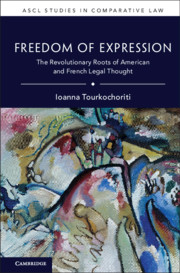Book contents
- Freedom of Expression
- ASCL Studies in Comparative Law
- Freedom of Expression
- Copyright page
- Contents
- Acknowledgments
- 1 Introduction
- 2 Antiquity, Modernity, and Historical Imaginaries on the Role of the Government
- 3 The Underlying Ex Ante Understanding of Liberty
- 4 The Moralizing Rational Republic versus the State Arbitrator of the Free Play of Interests
- 5 Foundation of the Rights of Man on the Rights of the Citizen versus Foundation of the Rights of the Citizen on the Rights of Man
- 6 Conclusion
- Bibliography
- Index
2 - Antiquity, Modernity, and Historical Imaginaries on the Role of the Government
Published online by Cambridge University Press: 29 October 2021
- Freedom of Expression
- ASCL Studies in Comparative Law
- Freedom of Expression
- Copyright page
- Contents
- Acknowledgments
- 1 Introduction
- 2 Antiquity, Modernity, and Historical Imaginaries on the Role of the Government
- 3 The Underlying Ex Ante Understanding of Liberty
- 4 The Moralizing Rational Republic versus the State Arbitrator of the Free Play of Interests
- 5 Foundation of the Rights of Man on the Rights of the Citizen versus Foundation of the Rights of the Citizen on the Rights of Man
- 6 Conclusion
- Bibliography
- Index
Summary
This chapter analyzes the terminology of negative and positive liberty used in the book. The difference in the approach to freedom of expression can be considered through the prism of the “quarrel between the Ancients and the Moderns.” The understanding of the role of the government in France as defining the content and limits of freedom of expression is an amalgam of elements of antiquity and modernity. It is reminiscent of the conception of the Ancients that the state incarnates prudence. In the United States, the spirit of the law on freedom of expression is closer to modernity and to natural rights philosophy. The historical heritage of absolute monarchy defined, on the imaginary level, the terms of the substitution of the nation for the king following the French Revolution. The American Revolution led to a conception of distrust toward the government. The central place of the law in the clauses that concern rights of the French Declaration shows trust toward the legislator to define the content and limits of liberty. The American declarations of rights, on the other hand, aim at guaranteeing rules, and transcend and limit ordinary legislative power.
- Type
- Chapter
- Information
- Freedom of ExpressionThe Revolutionary Roots of American and French Legal Thought, pp. 34 - 79Publisher: Cambridge University PressPrint publication year: 2021



